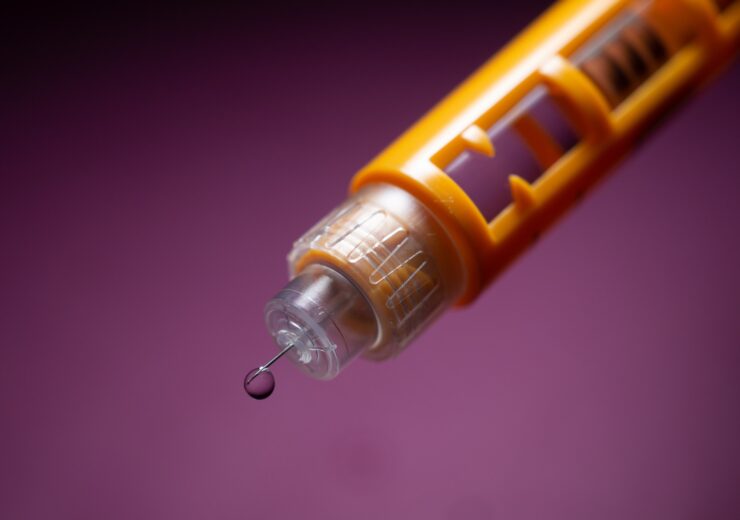After achieving primary endpoint by demonstrating superiority and non-inferiority in HbA1C reduction from baseline at week 52, investigative insulin icodec helped patients achieve significantly more time in target blood glucose range (Time in Range) vs once-daily basal insulin glargine U100 in ONWARDS 1

In the ONWARDS 1 and 3 trials, more people achieved blood glucose targets without clinically significant or severe hypoglycaemia with once-weekly basal insulin icodec vs once-daily basal insulin comparators. (Credit: Dennis Klicker on Unsplash)
Novo Nordisk today announced data from the phase 3a ONWARDS 1 and 3 trials evaluating investigative once-weekly basal insulin icodec, which were presented at the 83rd Annual Scientific Sessions of the American Diabetes Association (ADA). The data showed the studies met their primary endpoints, while reducing injections from seven to one per week, compared with once-daily basal insulin. Additionally, data from the ONWARDS 1 and 3 studies demonstrated that more insulin-naïve adults with type 2 diabetes treated with once-weekly basal insulin icodec achieved an HbA1c target of <7.0% without experiencing clinically significant or severe hypoglycaemia compared with once-daily basal insulin comparators at 52 and 26 weeks, respectively.
In ONWARDS 1, as a confirmatory secondary endpoint, superior Time in Range (blood glucose 70–180 mg/dL) was achieved with once-weekly basal insulin icodec vs once-daily basal insulin glargine U100 (71.9% vs 66.9%, respectively) from week 48–521. Comparable Time below Range (blood glucose <54 mg/dL) was achieved with once-weekly basal insulin icodec vs once-daily basal insulin glargine U100 (0.3% vs 0.2%, respectively) from week 48–52 in ONWARDS 11. Both values are in line with internationally recommended targets3.
”Time in Range provides additional information to help us assess glycaemic control and is an increasingly important tool to complement HbA1c measurements, which were substantially reduced by once-weekly basal insulin icodec. In ONWARDS 1, insulin icodec allowed people to spend significantly more Time in Range, with comparable Time below Range vs once-daily basal insulin glargine U100,” said Dr Julio Rosenstock, Lead Trial Investigator and Director of Velocity Clinical Research at Medical City Dallas and Clinical Professor of Medicine, University of Texas Southwestern Medical Center, US. “A once-weekly basal insulin has the potential to change how we treat people with type 2 diabetes needing basal insulin replacement.”
In ONWARDS 1, there were no statistically significant differences in mean weekly insulin dose (week 50–52) or in body weight change from baseline1. Rates of clinically significant hypoglycaemia (blood glucose <54 mg/dL) or severe hypoglycaemia (symptomatic requiring third party assistance regardless of blood glucose measurement), were low in both treatment groups1. Rates of clinically significant or severe hypoglycaemia were 0.30 events per patient year exposed and 0.16 events per patient year exposed to once-weekly insulin icodec and insulin glargine U100, respectively1. A statistically significant higher proportion of participants achieved an HbA1C target of <7% without clinically significant or severe hypoglycaemia with once-weekly basal insulin icodec vs once-daily basal insulin glargine U100 (52.6% vs 42.6%).
In ONWARDS 3, rates of clinically significant or severe hypoglycaemia were 0.31 events per patient-year exposed and 0.15 events per patient-year exposed to insulin icodec and insulin degludec respectively, at weeks 0–312. The estimated proportion of participants achieving an HbA1C target of <7% without clinically significant or severe hypoglycaemia was statistically significantly higher with once-weekly basal insulin icodec vs once-daily basal insulin degludec2. There were no significant differences in mean weekly insulin dose from week 24 to 26 or body weight change from baseline to week 26 between treatment arms2. No unexpected safety findings were observed1,2.
“These data reinforce our confidence in the potential of once-weekly insulin icodec,” said Florian M.M. Baeres, corporate vice president, Global Medical Affairs at Novo Nordisk. “If approved, we believe this innovation – which would be the world’s first once-weekly basal insulin – could help people living with type 2 diabetes ready to start insulin treatment by reducing the number of injections needed.”
Insulin icodec has been submitted for regulatory review in the US, Canada, Europe, China, Australia, Switzerland and Brazil. First decisions are anticipated in H1 2024. Pending approval, insulin icodec will represent the first and only once-weekly basal insulin option for adults with diabetes, addressing an unmet need in treatment vs a daily basal insulin option.
Source: Company Press Release
